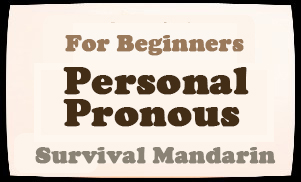 CHINESE PRONOUNS
There are just three basic pronouns in spoken Mandarin:
I, me – wǒ – 我
You – nǐ – 你
He, Him / She, Her / It – tā
Plurals
Plurals are formed by adding ‘men’ at the end of the pronoun:
We, Us – wǒ men – 我們
You – nǐ men – 你們
They, Them – tā men – 他們
When speaking to elders or someone in authority, it is more polite to address them formally with nín 您 instead of the less formal
nǐ – 你.
Wǒ – 我
I am a student.
►Wǒ shì xuéshēng.
我是學生。
I like ice cream.
►Wǒ xǐhuān bīngqílín.
我喜歡冰淇淋。
Nǐ – 你
Are you a student?
►Nǐ shì xuéshēng ma?
你是學生嗎?
Do you like ice cream?
CHINESE PRONOUNS
There are just three basic pronouns in spoken Mandarin:
I, me – wǒ – 我
You – nǐ – 你
He, Him / She, Her / It – tā
Plurals
Plurals are formed by adding ‘men’ at the end of the pronoun:
We, Us – wǒ men – 我們
You – nǐ men – 你們
They, Them – tā men – 他們
When speaking to elders or someone in authority, it is more polite to address them formally with nín 您 instead of the less formal
nǐ – 你.
Wǒ – 我
I am a student.
►Wǒ shì xuéshēng.
我是學生。
I like ice cream.
►Wǒ xǐhuān bīngqílín.
我喜歡冰淇淋。
Nǐ – 你
Are you a student?
►Nǐ shì xuéshēng ma?
你是學生嗎?
Do you like ice cream?
 ►Nǐ xǐhuan bīngqílín ma?
你喜歡冰淇淋嗎?
Tā – 她
She is a doctor.
►Tā shì yīshēng.
她是醫生。
She likes coffee.
►Tā xǐhuan kāfēi.
她喜歡咖啡。
She doesn’t have a car.
►Tā méi yǒu chē.
她沒有車。
Wǒmen – 我們
We are students.
►Wǒmen shì xuéshēng.
我們是學生。
We like ice cream.
►Wǒmen xǐhuan bīngqílín.]]>
►Nǐ xǐhuan bīngqílín ma?
你喜歡冰淇淋嗎?
Tā – 她
She is a doctor.
►Tā shì yīshēng.
她是醫生。
She likes coffee.
►Tā xǐhuan kāfēi.
她喜歡咖啡。
She doesn’t have a car.
►Tā méi yǒu chē.
她沒有車。
Wǒmen – 我們
We are students.
►Wǒmen shì xuéshēng.
我們是學生。
We like ice cream.
►Wǒmen xǐhuan bīngqílín.]]>
